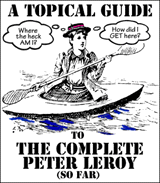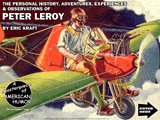
by Mark Dorset
Harvey Mindess:
The extent to which our sense of humor can help us to maintain our sanity is the extent to which it moves beyond jokes, beyond wit, beyond laughter itself. It must constitute a frame of mind, a point of view, a deep-going far-reaching attitude to life.
A cluster of qualities characterizes this peculiar frame of mind: flexibility, in this case an indvidual’s willingness to examine every side of every issue and every side of every side; spontaneity, his ability to leap from one mood or mode of thought to another; unconventionality, his freedom from the values of his time, his place, and his profession; shrewdness, his refusal to believe that anyone—least of all himself—is what he seems to be; playfulness, his grasp of life as a game, a tragicomic game that nobody wins but that does not have to be won to be enjoyed; and humility, that elusive quality. . . . A man who can shrug off the insufficiency of his ultimate wisdom, the meaninglessness of his profoundest thoughts, is a man in touch with the very soul of humor.
Each of these six qualities plays its part in the drama of the humorous outlook. The starring role, however, is reserved for another characteristic. We may call it the enjoyment of the ironies that permeate our lives. In order to command a therapeutic sense of humor, we must become acutely aware of the anomalies that run through all human affairs. We must come to know, not theoretically but practically, that the happiest relationships are larded with suffering, that the greatest accomplishments are anticlimactic, that rational acts are motivated by irrational drives, that psychotic thinking makes excellent sense. We must know that assertiveness is the mask of fearfulness, that humility is a kind of pride, that love is a euphemism for lust, that truth is the pawn of fashion, that we cherish our misery, and that we all are more irrational than we acknowledge.
Cyril Connolly:
The predicament of the humorist is that his sensibility, if it should go on developing, causes him to find things less and less amusing, “for all our wit and reading do but bring us to a truer sense of sorrow.” The . . . humorist must therefore either cease to be funny and thereby lose his entertainment status or abandon his integrity and, aesthetically stunted, continue to give his public what it wants. For this reason humorists are not happy men. Like Beachcomber or Saki or Thurber they burn while Rome fiddles, or, like P. G. Wodehouse, repeat themselves with profitable resignation.
Friedrich Schlegel:
Humor deals with being and not being; its peculiar essence is reflection. Hence, its kinship with elegy and with everything transcendental; hence, also, its arrognace and its affinity to the mysticism of wit. As genius is necessary for the naive, grave and pure beauty is necessary for humor. Preferably it hovers over lightly and clearly flowering rhapsodies of philosophy or poetry and flees from heavy bulks as well as from incoherent fragments.
Ben Shahn:
Humor itself is not—never was—mere jocularity. Humor is a way of feeling about life, and when humor is great it is almost never without one of its opposite moods—tenderness, tragedy, concern for man’s condition, recognition of man’s frailties, sympathy with his idealism. Think of how closely the performances of Charlie Chaplin skirted the borders of sadness—which is, of course, the reason why he was always a great comedian, not just an entertainer. Humor was intrinsic in the style of Klee, the great stylist. Humor, bitter humor, was the informing spirit of James Ensor. It ran like a fire through the most powerful works of Goya, with their sardonic laughter at cruelty and injustice. Humor is present in the penetratingly realistic portraits of Velazquez, too, and in those of Eakins. Humor, that in-seeing kind of humor, accounts for the unrealistic style of Kokoschka; humor is present in every object and every painting that Picasso has ever made. Humor, then, one might say, is an eruption stemming straight out of keen understanding and often out of hurt idealism.
Horizon, Vol. 1, No. 5, May 1959
The Canon in Don Quixote:
“When he has witnessed a comedy that is well and artfully constructed, the spectator will come out laughing at its humor, enlightened by the truths it contained, marveling at the various incidents, rendered wiser by the arguments, made more wary by the snares he has seen depicted, and more prudent by the examples afforded him; he will leave the theater hating vice and in love with virtue; such are the effects that a good comedy has upon the mind of the listener, however boorish and dull-witted he may be.”
Miguel de Cervantes, The Ingenious Gentleman Don Quixote de la Mancha
(translated by Samuel Putnam)
Oliver Edwards:
- I have tried too in my time to be a philosopher; but, I don't know
how, cheerfulness was always breaking in.
quoted by James Boswell in the entry for April 17, 1778
in Life of Samuel Johnson
(My thanks to Alan Wachtel for discovering the source of this remark.)
- It is to be hoped that, by patience and the Muses' aid, we may attain
that inward view . . . which shall describe a truth ever young and beautiful,
so central that it shall commend itself to the eye, at whatever angle beholden.
And the first condition is, that we must leave a too close and lingering
adherence to the facts, and study the sentiment as it appeared in hope
and not in history. . . . In the actual world -- the painful kingdom of
time and place -- dwell care, and canker, and fear. With thought, with
the ideal, is immortal hilarity, the rose of joy. Round it all the muses
sing.
I . . . cannot exist without the oxygen of laughter.Friedrich Schlegel :diary entry, January 1, 1961
There are ancient and modern poems which breathe, in their entirety and in every detail, the divine breath of irony. In such poems there lives a real transcendental buffoonery. Their interior is permeated by the mood which surveys everything and rises infinitely above everything limited, even above the poet's own art, virtue, and genius; and their exterior form by the histrionic style of an ordinary good Italian buffo.Folly:Aphorisms from the Lyceum
Foolish sage, please count up for me all the nights and days when your soul is tortured by anxieties -- heap all your life's troubles in one pile, and then at last you'll realize what the evils are from which I've saved my fools. Add the fact that they’re always cheerful, playing, singing, and laughing themselves, and bring pleasure and merriment, fun and laughter to everyone else wherever they go as well, as if the gods had granted them the gift of relieving the sadness of human life.in Erasmus of Rotterdam's Praise of Folly (1509)
Painter Jay DeFeo:
Only by chancing the ridiculous can I hope for the sublime.Bassist Christian McBride:in her artist's statement,
catalogue for the "Sixteen Americans" exhibition,
Museum of Modern Art, 1959
Someone got on me for smiling too much on stage. I say, get out of my face, I'm having fun. I'm not going to frown because it looks hipper in your eyes. He certainly wouldn't have said that to Dizzy Gillespie. I guess when the music got more serious and searching in the 6o's, to look gleeful probably wouldn't match. But we're playing happy music, so why not look like it? I didn't watch James Brown all those years for nothing.Friedrich Schlegel:quoted by Joseph Hooper in "Godson of Soul,"
The New York Times Magazine, June 25, 1995
Socratic irony is the only entirely involuntary and nevertheless completely conscious dissimulation. It is equally impossible to attain it artificially or to betray it. For him who does not possess it, it will remain an enigma even after the frankest avowal. It will deceive only those who consider it an illusion, who either enjoy its delightful archness of mocking at everybody or who become angry when they suspect that they too are meant. In it, everything must be jest and yet seriousness, artless openness and yet deep dissimulation. It originates in the union of a sense of an art of living and a scientific intellect, in the meeting of accomplished natural philosophy and accomplished philosophy of art. It contains and incites a feeling of the insoluble conflict of the absolute and the relative, of the impossibility and necessity of total communication. It is the freest of all liberties, for it enables us to rise above our own self; and still the most legitimate, for it is absolutely necessary. It is a good sign if the harmonious dullards fail to understand this constant self-parody, if over and over again they believe and disbelieve until they become giddy and consider jest to be seriousness and seriousness to be jest.Victor F. Weisskopf:Friedrich Schlegel, Aphorisms from the Lyceum, 1797 (translated by Ernst Behler and Roman Struc)
One can imagine what atmosphere, what life, what intellectual activity reigned in Copenhagen at that time [1922-1930]. Here was Bohr's influence at its best. Here it was that he created his style, the Kopenhagener Geist, a style of a very special character that he imposed upon physics. He could be seen, the greatest among his colleagues, acting, talking, living as an equal in a group of young, optimistic, jocular, enthusiastic people, approaching the deepest riddles of nature with a spirit of joy that can hardly be described. As a very young man, when I had the privilege of working there, I remember that I was taken a little aback by some of the jokes that crept into the discussion--they seemed to me to indicate a lack of respect. I communicated my feelings to Bohr, and he gave me the following answer:There are things that are so serious that you can only joke about them.Victor F. Weisskopf,
"Niels Bohr, the Quantum, and the World,"
in Niels Bohr: A Centennial Volume
See also:
Happy as a Clam
Irony
Comedy
E-mail it to me, Mark Dorset.

 Here
are a couple of swell ideas from Eric Kraft's vivacious publicist, Candi
Lee Manning:
Here
are a couple of swell ideas from Eric Kraft's vivacious publicist, Candi
Lee Manning:
